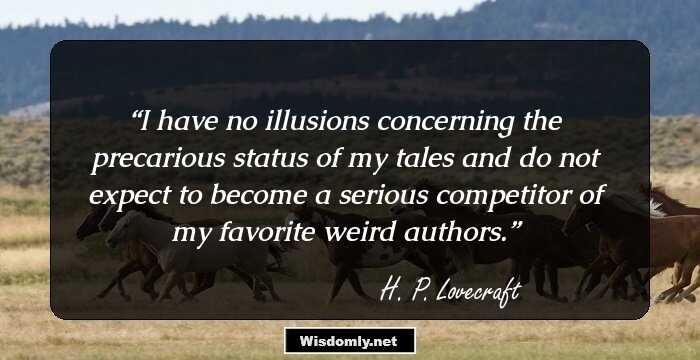76 Thought-provoking Quotes By August Wilson
Fredrick August Kittel, better known as August Wilson, was a renowned American playwright. He is one of the few writers to receive the Pulitzer Prize for Drama twice for his work in ten play series ‘The Pittsburg Cycle’. The series is divided into ten plays depicting struggles of the African-American community during various decades of the century. His other popular works include plays such as Joe Turner's Come and Gone, Two Trains Running and Gem of the Ocean. Along with the Pulitzer’s prize, he went on to receive prestigious awards such as Whiting Award, New York Drama Critics Circle Award, St. Louis Literary Award and American Theatre Critics' Association Award. In 2006, he was also inducted into the American Theatre Hall of Fame. The childhood residence of Wilson was declared as a historic landmark by the state of Pennsylvania. Various theatres, community parks and public location have been named after Wilson to honor his credentials in the field of drama. Besides his literary work, his thoughts and sayings developed quite a cult following due to the issues he shed light onto such as racism, equality, and oppression. Read through this exclusive collection of quotes from August Wilson.
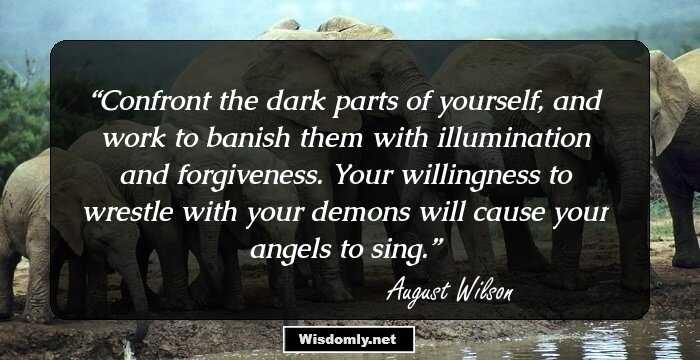
Confront the dark parts of yourself, and work to banish them with illumination and forgiveness. Your willingness to wrestle with your demons will cause your angels to sing.
I do - very specifically, I remember Bessie Smith; I used to collect 78 records that I would buy from the St Vincent de Paul store at five cents apiece, and I did this indiscriminately. I would just take whatever was there. And I listened to Patti Page and Walter Huston, 'September Song.'
I dropped out of school, but I didn't drop out of life. I would leave the house each morning and go to the main branch of the Carnegie Library in Oakland where they had all the books in the world... I felt suddenly liberated from the constraints of a pre-arranged curriculum that labored through one book in eight months.
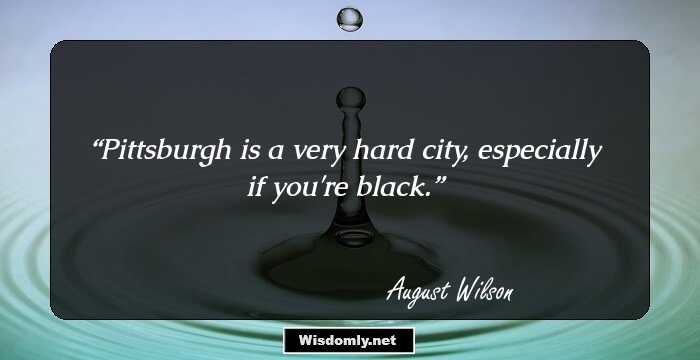
Pittsburgh is a very hard city, especially if you're black.
My first wife is a good woman, I still can't say nothing bad about her other than the fact that we had a difference on religion. She wanted someone who was a Muslim who shared those values. And I was like a heathen. I had to stay home on Sundays and watch the football game.
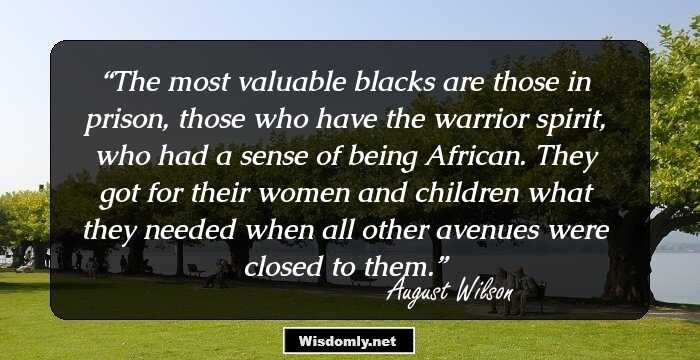
The most valuable blacks are those in prison, those who have the warrior spirit, who had a sense of being African. They got for their women and children what they needed when all other avenues were closed to them.
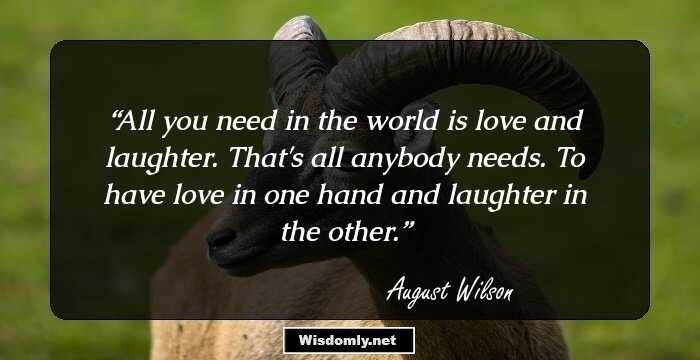
All you need in the world is love and laughter. That's all anybody needs. To have love in one hand and laughter in the other.
I think all in all, one thing a lot of plays seem to be saying is that we need to, as black Americans, to make a connection with our past in order to determine the kind of future we're going to have. In other words, we simply need to know who we are in relation to our historical presence in America.
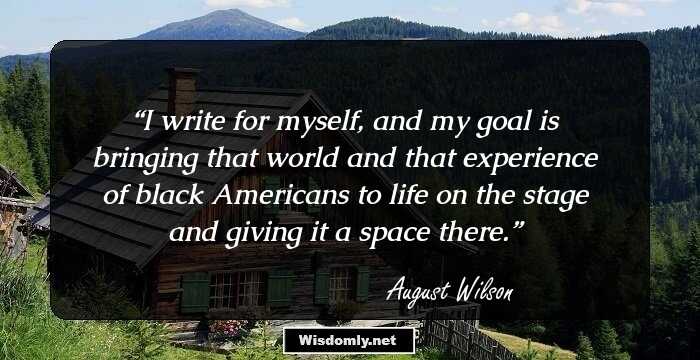
I write for myself, and my goal is bringing that world and that experience of black Americans to life on the stage and giving it a space there.
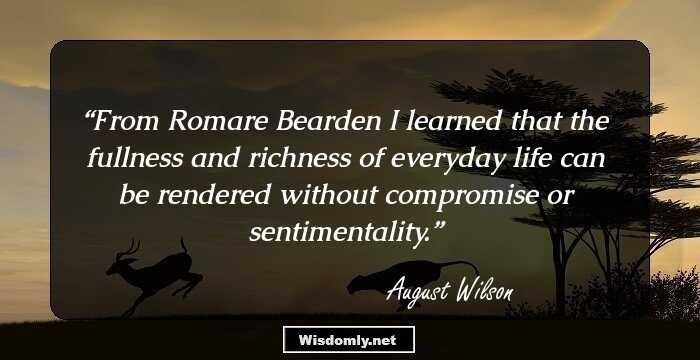
From Romare Bearden I learned that the fullness and richness of everyday life can be rendered without compromise or sentimentality.
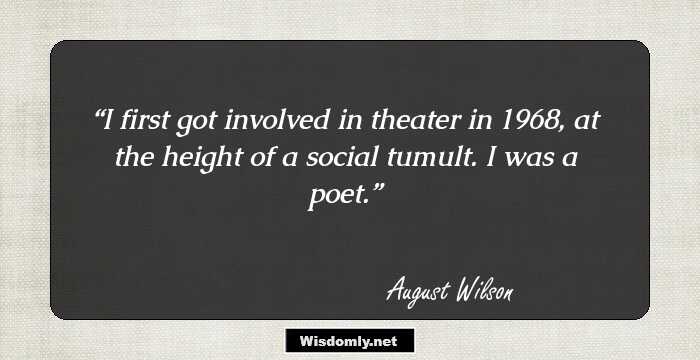
I first got involved in theater in 1968, at the height of a social tumult. I was a poet.
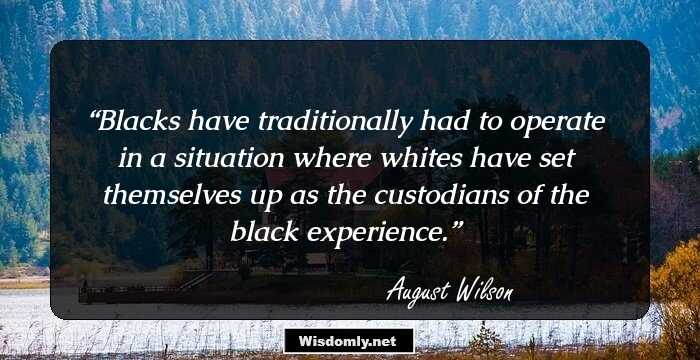
Blacks have traditionally had to operate in a situation where whites have set themselves up as the custodians of the black experience.
I think it was the ability of the theater to communicate ideas and extol virtues that drew me to it. And also, I was, and remain, fascinated by the idea of an audience as a community of people who gather willingly to bear witness.
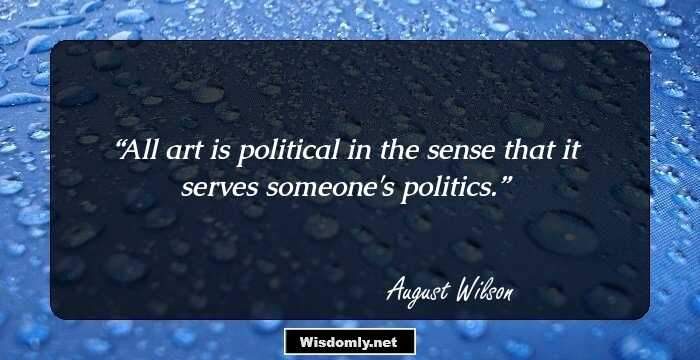
All art is political in the sense that it serves someone's politics.
I'm a De Niro fan. I went eleven years without seeing a movie; the last one before that, February 1980, was De Niro and Scorsese in 'Raging Bull,' and when I went back, it was 'Cape Fear,' with De Niro and Scorsese. I picked up right where I left off at.
I had always been fascinated with Napoleon because he was a self-made emperor; Victor Hugo said, 'Napoleon's will to power,' and it was the title of my paper. And I submitted it to my teacher, and he didn't think I had written it. And he wanted me to explain it to him.
The blues are important primarily because they contain the cultural expression and the cultural response to blacks in America and to the situation that they find themselves in. And contained in the blues is a philosophical system at work. And as part of the oral tradition, this is a way of passing along information.
A novelist writes a novel, and people read it. But reading is a solitary act. While it may elicit a varied and personal response, the communal nature of the audience is like having five hundred people read your novel and respond to it at the same time. I find that thrilling.
Like most people, I have this sort of love-hate relationship with Pittsburgh. This is my home, and at times I miss it and find it tremendously exciting, and other times I want to catch the first thing out that has wheels.
I once wrote a short story called 'The Best Blues Singer in the World,' and it went like this: 'The streets that Balboa walked were his own private ocean, and Balboa was drowning.' End of story. That says it all. Nothing else to say. I've been rewriting that same story over and over again. All my plays are rewriting that same story.
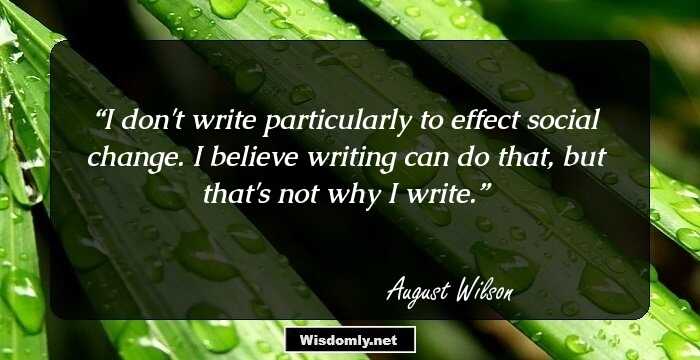
I don't write particularly to effect social change. I believe writing can do that, but that's not why I write.
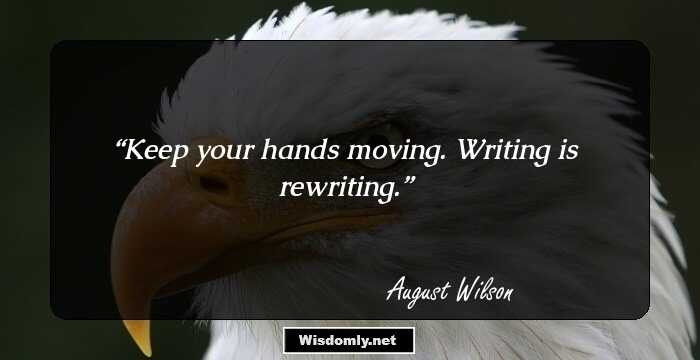
Keep your hands moving. Writing is rewriting.
I don't look at our society today too much. My focus is still in the past, and part of the reason is because what I do - the wellspring of art, or what I do - l get from the blues. So I listen to the music of a particular period that I'm working on, and I think inside the music is clues to what is happening with the people.
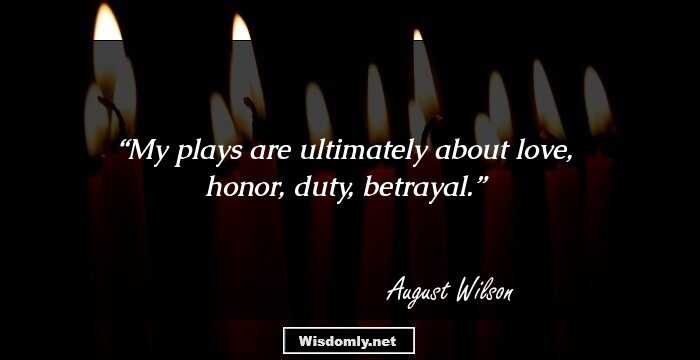
My plays are ultimately about love, honor, duty, betrayal.
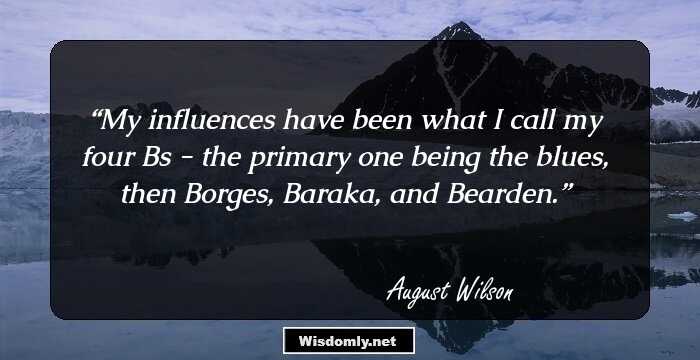
My influences have been what I call my four Bs - the primary one being the blues, then Borges, Baraka, and Bearden.
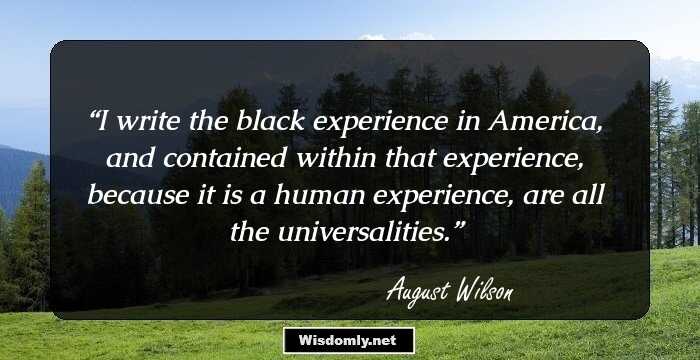
I write the black experience in America, and contained within that experience, because it is a human experience, are all the universalities.
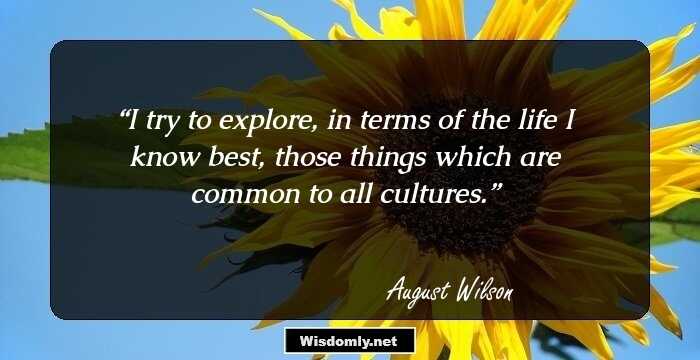
I try to explore, in terms of the life I know best, those things which are common to all cultures.
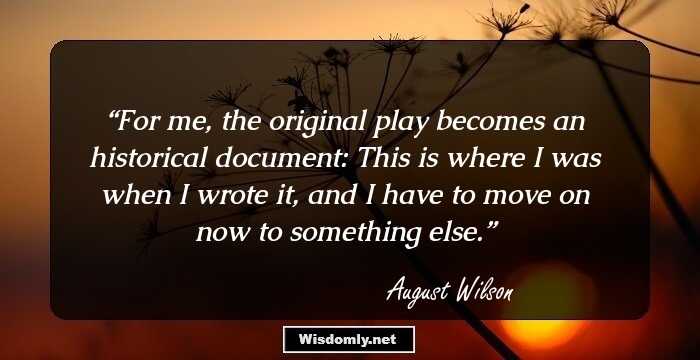
For me, the original play becomes an historical document: This is where I was when I wrote it, and I have to move on now to something else.
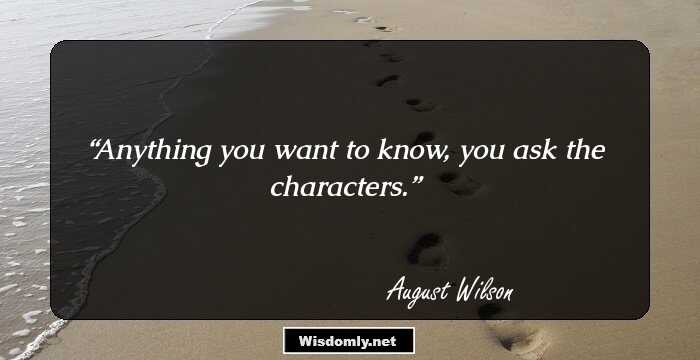
Anything you want to know, you ask the characters.
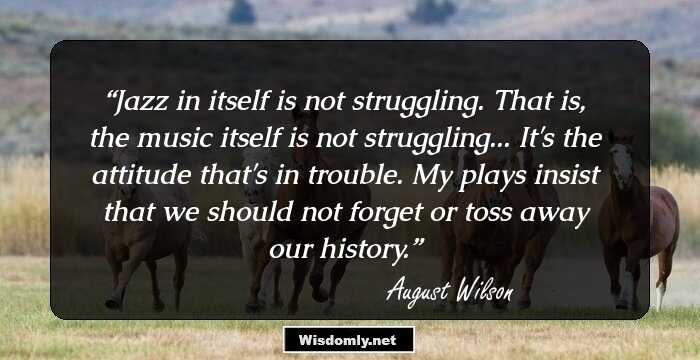
Jazz in itself is not struggling. That is, the music itself is not struggling... It's the attitude that's in trouble. My plays insist that we should not forget or toss away our history.


